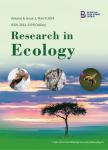Impacts on Bats by a Supertyphoon *** Typhoons along a Habitat Urbanization Gradient
作者机构:Science and Technology GroupOkinawa Institute of Science and Technology Graduate University1919-1 TanchaOnna-sonOkinawa904-0495Japan Department of PsychologyUniversity of Tennessee1404 Circle DriveKnoxvilleTN 37996USA 3 Biodiversity and Biocomplexity UnitOkinawa Institute of Science and Technology Graduate University1919-1 TanchaOnna-sonOkinawa904-0495Japan
出 版 物:《Research in Ecology》 (生态学研究(英文))
年 卷 期:2023年第5卷第2期
页 面:14-27页
学科分类:07[理学] 070601[理学-气象学] 0706[理学-大气科学]
主 题:Acoustic monitoring Chiroptera Climate change Extreme weather events Hurricanes OKEON Okinawa Urbanization gradient
摘 要:Two major human-caused threats to ecosystems are habitat modification and the increasing frequency and intensity of extreme weather *** study the combined effect of these threats,the authors used acoustic monitoring of bats along a habitat modification gradient on the island of Okinawa,*** the observation period,the island experienced numerous typhoons and one *** bat species remained active even at high wind speeds(up to 30 m/s in some cases).Milder typhoons had no observable effect on bat populations,with activity levels fully recovering within a few hours or *** super typhoon also did not seem to affect bats in fully or partially forested habitats but caused their local disappearance at the urban site,which they have not re-colonized three years after the ***,bats that disappeared at the urban site were species roosting in well-protected places such as caves and concrete *** all cases,the biomass of small flying insects and the acoustic activity of insects recovered within days after extreme weather ***,the striking difference between habitats in supertyphoon effects on bats cannot be explained by the super typhoon directly killing bats,destroying their roosting sites,or decreasing the abundance of their *** results underscore the importance of preserving natural habitats in areas particularly affected by changing climate and show that the survival of species and ecosystems during the numerous episodes of climate change in the Earth’s history does not necessarily mean their ability to survive the accelerating climate change of our time.



